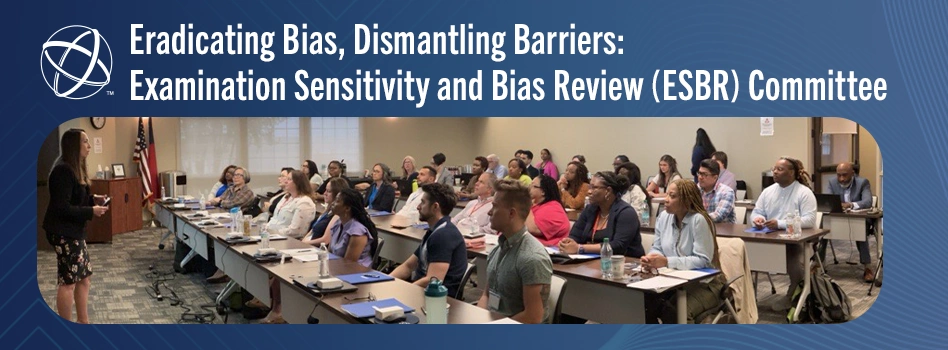
Equitable access to counseling is at the core of NBCC's efforts to expand and advance the counseling profession. The World Health Organization reports 1 in every 8 people lives with a mental disorder. It is imperative that diverse populations have access to counselors who can represent them. The Examination Sensitivity and Bias Review (ESBR) Committee is working to address this by ensuring the examination programs are equitably accessible and free from bias.
The ESBR Committee recently convened at NBCC’s headquarters in Greensboro, North Carolina, with subject matter experts (SMEs) traveling from across the country, to audit examination items on the National Counselor Examination (NCE), the National Clinical Mental Health Counseling Examination (NCMHCE), and the Counselor Preparation Comprehensive Examination (CPCE). The ESBR Committee engaged in a robust discussion and review of data points and the performance of items to identify questions which could be revised to address issues that could potentially pose a barrier to examinees.
Committee members ensure examinations are representative of the broad spectrum of examinees on track to become counselors. This includes assessing representation of race, ethnicity, gender identity, sexual orientation, native language, ability, and more. The goal is to ensure counselors-in-training have a fair and equitable opportunity to pass the examination and serve as mental health professionals in their communities.
“I chose to be a part of the ESBR Committee to be the change that I wanted to see in the profession,” says counselor educator Tanisha Sapp, EdD, NCC, MAC, ACS, LPC, CPCS, CST, SAP.
In addition to reviewing current examination content, the ESBR process will inform the development of guidelines for examination item writers and reviewers to address bias at the start of the examination creation process. So far, the ESBR Committee has created language guidelines on race, ethnicity, gender, and sexual orientation. The committee regularly assesses examinations to determine potential method bias and how to move forward.
NBCC is one of the first credentialing organizations serving mental health professions working to identify and eradicate potential bias within the examinations at this level. The ESBR Committee is working to ensure that the diverse array of examinees are met with examinations that are fair, equitable, and accessible.
NBCC will also engage the ESBR Committee to audit other examinations, including the TeleMental Health Examination.
Callie Marino, Vice President of Credentialing and Quality Assurance, says NBCC is intentional about involving a diverse group of counselors in this work to represent the diversity of the clients they serve.
“Something I’m really proud of is the NCMHCE and the representation that is present in our items. Our candidates can see themselves in the work that they’re reading. They can see the clients that they’re serving in the tests in front of them,” Marino says.
No matter who is taking our examinations, NBCC wants everyone to be included. Mental health impacts people around the world, and many communities don’t have access to the care they need. Solving mental health disparities starts here, with supporting the future counselors who represent those diverse communities. Learn more about this impactful work on our website.